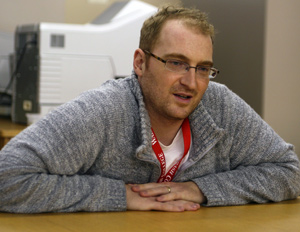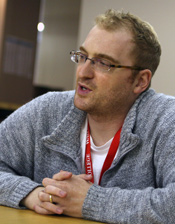Prengaman '98 Has Covered World as Journalist
by Patrick McAlister '10
July 15, 2008
Peter Prengaman'98 has taken the idea of a ‘well rounded’ liberal arts education’ to its zenith. In the short ten years since he graduated from the College, he has lived in many countries and speaks multiple languages - Spanish, French, Portuguese, Arabic and even some Turkish.
 In addition to having an insatiable appetite for language, Prengaman is a journalist, who has worked for news organizations on four continents, ranging from the Wall Street Journal Europe to Morocco Today. For the past six years he has written and edited for the Associated Press (AP), most recently as Multimedia Editor based out of Atlanta. In addition to having an insatiable appetite for language, Prengaman is a journalist, who has worked for news organizations on four continents, ranging from the Wall Street Journal Europe to Morocco Today. For the past six years he has written and edited for the Associated Press (AP), most recently as Multimedia Editor based out of Atlanta.
Like many successful graduates, it should not be a surprise that both passions were discovered and honed at Wabash College.
"At Wabash, I fell in love with Spanish," he said. "I started out as a math major of all things. I did a year of that and liked it but then fell in love with English literature. Then my sophomore year, while I was taking the requirement of Spanish 1, something snapped and I fell in love with it.
"In the span of one term I decided I wasn't going to do a study abroad in England. I was instead going to Spain and ended up majoring in Spanish and English. It was a natural fit."
While At Wabash, Prengaman's passion for writing was truly honed; he wrote for the Bachelor all four years and served as Features Editor his senior year. He also revived the White Rabbit, a fiction writer's magazine, and submitted poetry for the Wabash Review.
"I did a lot of writing," he said. "That is one of the best things about Wabash. Wabash prepares you in ways you can't even imagine; this is especially true with two things - the ability to think critically and to write well. I have come across people in high levels of journalism or people with PhDs who cannot write well."
Like many Wallys, Prengaman's choice of Wabash was based on no single rationale, but rather a confluence of reasons.
"I kind of had this idea in my head," the native Oregonian said. "I grew up in the northwest and I wanted to live in another region of the country and the Midwest seemed cool. I looked at schools in Indiana and had heard of Wabash from a friend who was a year ahead of me in school. I just visited Wabash on a whim as my mom and I made a trip to look at different schools. I just fell in love with it - I fell in love with the small campus, with the thought that I was going to be able to play sports."
Although the Midwest location, campus size and opportunity to play sports were major factors in his decision, there was one that loomed above all the rest.  "The all-male environment was what really sold me the most," said Prengaman, a Lilly Scholar. "I grew up in a house of four boys. I had three adopted brothers; one from India and two from Brazil. It was a very macho household - 'if you get up from your seat I'll eat your dinner.' Growing up I didn't really have a relationship with my father, and although I felt like I knew what it was to be a 'macho man', I didn't feel like I knew what it was to be a man in the adult sense of the word." "The all-male environment was what really sold me the most," said Prengaman, a Lilly Scholar. "I grew up in a house of four boys. I had three adopted brothers; one from India and two from Brazil. It was a very macho household - 'if you get up from your seat I'll eat your dinner.' Growing up I didn't really have a relationship with my father, and although I felt like I knew what it was to be a 'macho man', I didn't feel like I knew what it was to be a man in the adult sense of the word."
"Wabash seemed to me a place where I could get mentors and have the fatherly influence in a way I never had growing up. It turned out to really be the case."
After graduating, Prengaman accepted an internship with The Wall Street Journal Europe and after that a job with Cinco Dia, a Spanish economic newspaper. He then returned to his home state to edit The Sentinel, a Spanish language newspaper.
"That was a real interesting experience," he said, "because I was writing and editing in Spanish. I was a suma cum laude undergraduate in Spanish, but to write well in Spanish was at another higher level. I had to ramp up my written Spanish. It was a job I walked into; they didn't have anybody and I had a good level of Spanish."
After finishing a masters in Latin American Studies at Stanford and then moving on to Morocco for six months then to and Chile as a Rotary Scholar (where he met his wife), Prengaman moved to settled in Los Angeles to work for with Associated Press. The sheer breadth of what an AP reporter covers necessitates a "liberal arts" approach to education. The AP turned out to be the perfect place for a liberally educated journalist. Prengaman has now been with the AP for six years. Working for an all encompassing news agency, Prengaman noted, is very different than any other publication he had worked for.
"The AP is just so much bigger," he said. "It has breathtaking power, in terms of the range - which is a good thing and a bad thing. It's a bad thing if there are errors in the story - it goes out to the world. I think working for the Associated Press you get a lot of interviews and get a lot of certain treatment because people know how it works."
The sheer independence of the AP is another benefit which translates into better stories.
"We don't have what a traditional paper has in terms of advertisers," he said, "so there's no worry that we're beholden to somebody. I think at least from our perspective, we don't have bias. In my six years in several different bureaus and overseas, I haven't had an instance where a story was killed because of something political."
Covering almost everything has clear detriments too. AP reporters operate without the traditional sense of community other reporters are able to garner grasp, Prengaman said.
"Say you're working for the Indianapolis Star," Prengaman continued. "You write an article and somebody calls you or maybe you go out and talk to people in the community - you build much more of a relationship with people. Whereas in the AP, you may write a great story from LA that somebody could take a big interest in Bangkok, but chances are you probably aren't ever going to talk to those people. They might send you an email or they might call you or something but it's a lot more anonymous."
After his stint in LA, Prengaman was sent to the Caribbean as an AP correspondent. He covered everything from politics to hurricanes to missing person accounts. He led the AP's coverage of the disappearance of Natalie Holloway in Aruba. Without developing the community where you report, crafting good coverage of a story may require inventive solutions when a reporter is constantly being whisked away to different locations.
"It is hard to be sent to a place on a whim," he said, "but that's the bread and butter of correspondents. Sometimes they get it wrong and sometimes their coverage isn't as nuanced, thoughtful and critical as it should be, but that was my life for two years."
"I remember when I arrived in Jamaica to cover a hurricane," he said, "I didn't know anything about Jamaica and had to get to strategic places and talk to the right people. I met some guy and basically said 'I'm going to pay you $100 and you're going to drive me everywhere'. I had rented a car, but they were driving on the other side of the road."
Prengaman notes that developing these resources usually comes on a shoe string budget.
"Sometimes you can expense those things but it gets difficult," he said. "You've got bean counters in New York and they want receipts for this and that. You're in the middle of a hurricane, and they want a stamped receipt?"
Before his current post, Prengaman returned to LA to work specifically on the issue of immigration. He wrote about it for Wabash Magazine in 2007. He noted that writing on such a divisive issue forces a journalist to refocus on crafting unbiased coverage. "It's something you fight in your copy to make sure it is as balanced and as fair as you can be," he said. "Any journalist who tells you they're completely objective is fooling himself. We all have a point of view; even if you say to yourself 'I'm writing a completely objective article' the decision to quote one person instead of another person is a subjective choice. I did write things and get things from people who are really hard core on the right that I'm a 'Latin Lover'. If I wrote something critical of immigrants I'd get nasty emails."
Throughout his career as a journalist in the many countries he has visited with the many languages he has spoken, it is clear that Prengaman has taken the 'lifetime learning' concept that is central to a liberal arts education seriously. With such a successful career and experiences many do not have in a lifetime just ten years after graduation from Wabash, it is clear that his liberal arts foundations have served him well.
|


Keith Veal

Tom Fisher

Scott Schroeder

Rob Paugh

Tom Bailey

Jake Knott

Ryan Smith

Zach Raber

Peter Prengaman

Kevin Gearheart

Mark Doyle

Scott Medsker

Jonathan Walsh

Mike Wells

Michael Nogen

Ben Lower

Adam Cole

Steve Woods

Nate Clark

Chris Cotterill

Chad Bush

Greg Jania

Victor Koshkin

Trevor Fanning

John Jefferson

Theodore Johnson

Andrew Naugle

Steve Mackin

Marcus Doshi

Wes Zirkle
|


 In addition to having an insatiable appetite for language, Prengaman is a journalist, who has worked for news organizations on four continents, ranging from the Wall Street Journal Europe to Morocco Today. For the past six years he has written and edited for the Associated Press (AP), most recently as Multimedia Editor based out of Atlanta.
In addition to having an insatiable appetite for language, Prengaman is a journalist, who has worked for news organizations on four continents, ranging from the Wall Street Journal Europe to Morocco Today. For the past six years he has written and edited for the Associated Press (AP), most recently as Multimedia Editor based out of Atlanta.  "The all-male environment was what really sold me the most," said Prengaman, a Lilly Scholar. "I grew up in a house of four boys. I had three adopted brothers; one from India and two from Brazil. It was a very macho household - 'if you get up from your seat I'll eat your dinner.' Growing up I didn't really have a relationship with my father, and although I felt like I knew what it was to be a 'macho man', I didn't feel like I knew what it was to be a man in the adult sense of the word."
"The all-male environment was what really sold me the most," said Prengaman, a Lilly Scholar. "I grew up in a house of four boys. I had three adopted brothers; one from India and two from Brazil. It was a very macho household - 'if you get up from your seat I'll eat your dinner.' Growing up I didn't really have a relationship with my father, and although I felt like I knew what it was to be a 'macho man', I didn't feel like I knew what it was to be a man in the adult sense of the word." 




























